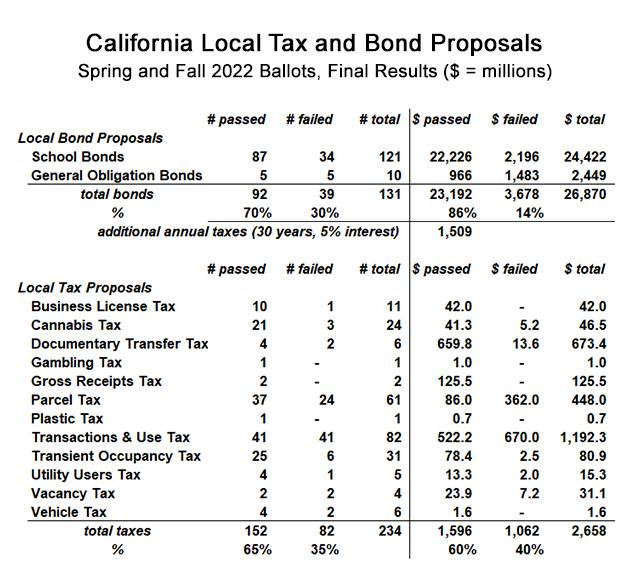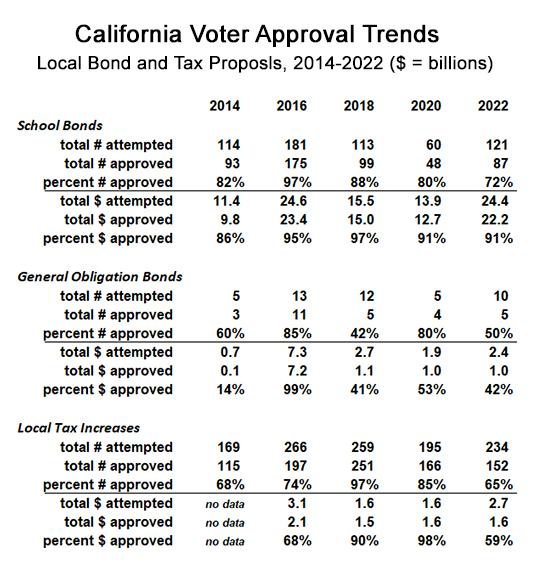Voters Approve Over $3.0 Billion Per Year in New Local Taxes
When state ballot initiatives propose new taxes, it’s big news. But while every election features a handful of state tax and bond proposals that get statewide attention, additional hundreds of local state and bond proposals fly under the radar.
Fortunately, after each election cycle and once all the votes are certified – something that in California doesn’t occur until 30 days after election day – the California Taxpayers Association puts out a report that shows the outcome of every local tax and bond proposal.
This past November, 131 bond proposals were placed on local ballots up and down the state, along with 234 local tax proposals. Of the proposed local bonds, 86 percent of them were approved by voters, dumping another $23.2 billion in debt onto Californians. In terms of budget impact, based on a 5 percent interest rate and a 30 year term, this new borrowing is going to cost taxpayers another $1.5 billion per year in principal and interest payments.
The fate of local tax proposals tells a similar story. 65 percent of them were approved by voters, adding another $1.6 billion annual burden onto California’s taxpayers.
These local increases in taxes and borrowing, which are almost exclusively regressive and will cost taxpayers at least another $3.1 billion per year, are comparable to the impact of Proposition 30 —the statewide ballot initiative rejected by voters in November— which would have added another 1.75 percent tax on personal income above $2.0 million for California’s already overtaxed wealthy households. It was estimated that Prop. 30, had it passed, would have brought in between $3.0 and $5.0 billion per year.
It’s interesting to see the categories of new local taxes. Note on the chart below the projected big earner categories: “Documentary Transfer Tax,” “Gross Receipts Tax,” and “Transactions and Use Tax” (sales tax). The first two of these three are relatively recent innovations in a system that for decades relied primarily on sales tax. Expect more innovative tax schemes, such as “Vacancy Tax,” presumably designed to discourage people from owning real estate unless they plan for it to be occupied.

The propensity for voters to approve local taxes is well documented, as the next chart proves. The only category that has not performed extraordinarily well over the past ten years are General Obligation Bonds, which, while more likely than not to pass, rarely deliver supermajority rate of approval. This is because School Bonds only require a 55 percent majority in order to pass, whereas General Obligation Bonds require a two-thirds majority.
When proponents only have to get 55 percent of voters to approve a bond, it does pretty well. Measured by the amount of proposed borrowing, school bonds consistently log over 90 percent approval by California’s local voters. The payments to service these bonds typically appear on the property tax bills of homeowners, and the amounts are not trivial. Most Californians can expect to pay considerably more than the legislated maximum of 1 percent of their home’s value, mostly thanks to local school bonds that are exempt from these limits.
As for local taxes, 2022 was a below average year for proponents, passing “only” 65 percent of them by number, and 59 percent by amount. While highly favoring proponents, this rate of approval is considerably lower than in previous elections, and may indicate voter fatigue with new taxes.

Although California voters did not approve a single statewide tax or bond proposal in 2022, thanks to these local measures, over $3.0 billion was added to their annual tax burden.
It’s a little early to look ahead to 2024, but three initiatives have already qualified for the November 2024 ballot. One of them aims to “increase personal income taxes to fund pandemic detection and prevention.” Expect additional statewide proposals to increase taxes, since California’s much vaunted budget surplus has evaporated. Voters may also count on hundreds of local tax and bond proposals, and if history is any guide, shall approve the vast majority of them.
Edward Ring is a senior fellow with the California Policy Center, which he co-founded in 2013. Ring is the author of Fixing California: Abundance, Pragmatism, Optimism (2021) and The Abundance Choice: Our Fight for More Water in California (2022).
